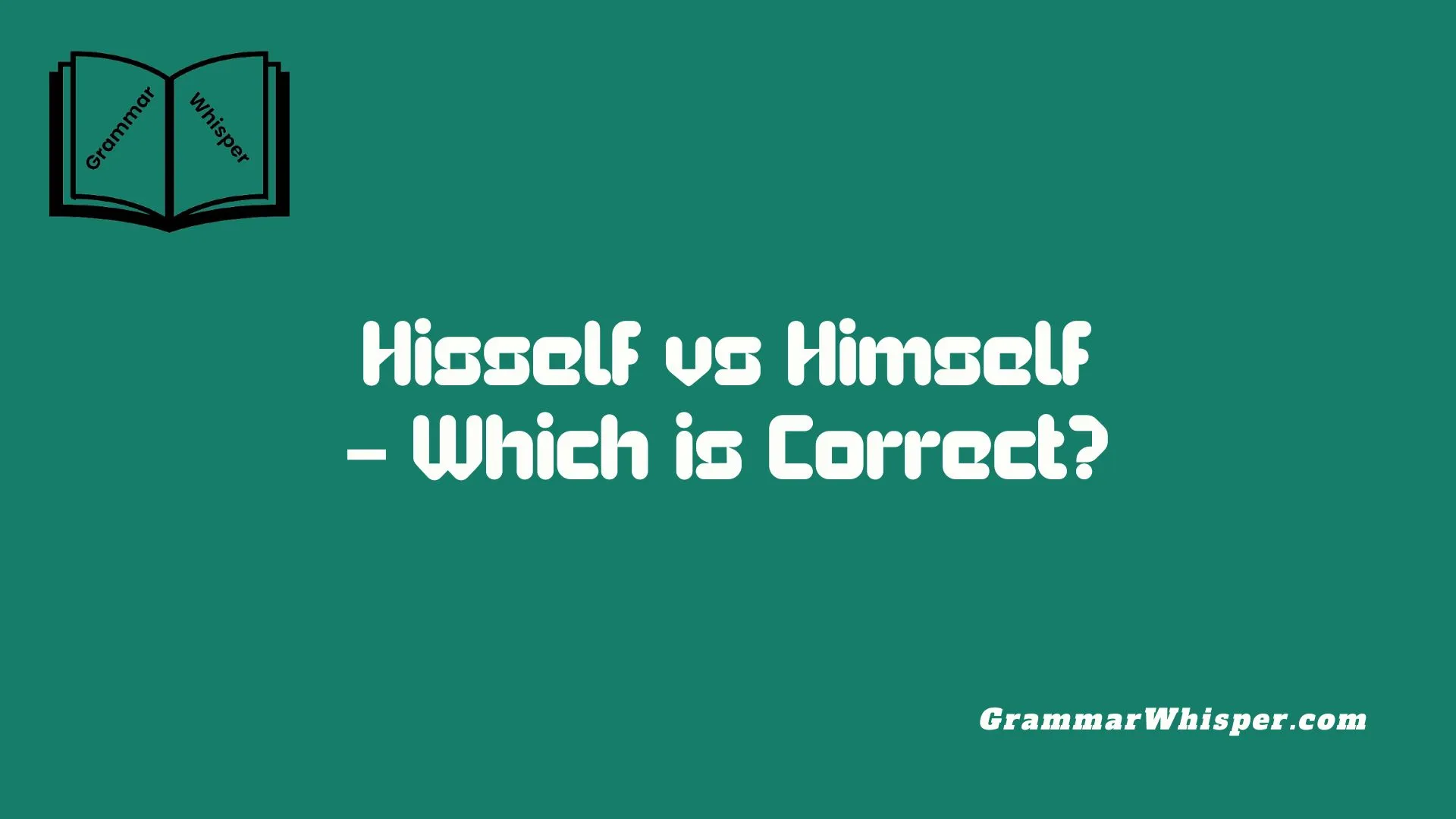The English language is a beautifully complex, ever-evolving system, but even experienced writers can get tripped up by its intricate grammar rules. A classic case of this confusion lies in the mix-up between Hisself vs Himself. As someone who has worked as a writing coach, I’ve often been asked about which pronoun is correct to use. It’s not just a random question – it genuinely stumps both native and non-native speakers. What seems like a minor quirky detail is actually a full-blown grammatical conundrum, rooted deeply in historical context, linguistic research, and evolving modern usage norms.
Whether it’s in casual conversation, informal blog posts, or everyday writing, some still try to defend hisself. But when we examine reliable sources, style guides, and the standard form, the facts are hard to argue with: himself is correct. The breakdown often comes from blending similar-sounding structures in spoken speech. But when you review real-world examples, and understand how reflexive pronouns properly function within sentence patterns, everything clicks. Getting this right enhances clarity, builds professionalism, and clears up years of confusion – all triggered by a single, misused word.
Understanding Reflexive Pronouns: A Quick Refresher
Reflexive pronouns are used when the subject and object of a sentence are the same person or thing. They’re essential in everyday English and help maintain sentence clarity.
Standard reflexive pronouns include:
| Subject Pronoun | Reflexive Pronoun |
| I | myself |
| you | yourself |
| he | himself |
| she | herself |
| it | itself |
| we | ourselves |
| you (plural) | yourselves |
| they | themselves |
Reflexive pronouns are used:
- When the subject does something to itself: He hurt himself.
- For emphasis: I made the cake myself.
- In idiomatic expressions: She kept it to herself.
In this system, “himself” is the reflexive form of “he.” But where does “hisself” come in?
The Standard: What Makes ‘Himself’ Grammatically Correct
“Himself” is the only standard, grammatically correct reflexive pronoun used for the third person singular masculine subject “he.”
Historical Background:
- Originates from Old English “himself” (“him” + “self”)
- Used for over 1000 years in written English
- Appears in all formal grammar guides and dictionaries
“The reflexive form ‘himself’ has been standard since Middle English, used in both literature and formal documentation.” – Cambridge Grammar of the English Language
According to Merriam-Webster and Oxford English Dictionary, “himself” is the correct and universally accepted form across all varieties of Standard English.
‘Hisself’: A Nonstandard Variation Explained
Despite the authority of “himself,” the term “hisself” continues to pop up. Here’s why.
Origins of ‘Hisself’:
- Traces back to dialectal variations in Southern American English and African American Vernacular English (AAVE)
- Likely a result of analogical formation from “his” + “self”
Why it’s Nonstandard:
- Not listed as a reflexive pronoun in any grammar book
- Marked as incorrect in formal writing
- Still common in informal speech and regional dialects
“‘Hisself’ is considered a nonstandard reflexive form and should be avoided in edited prose.” – Chicago Manual of Style
Grammar Rules Backing the Use of ‘Himself’
To understand why “himself” is correct and “hisself” isn’t, you need to understand how reflexives are constructed in English.
Construction Pattern:
Reflexive = Possessive/Objective Pronoun + “self” or “selves”
But there’s a catch:
- We use the objective pronoun form for reflexives (e.g., him > himself)
- We don’t use the possessive form (e.g., his > hisself)
That’s why:
- Correct: He blamed himself.
- Incorrect: He blamed hisself.
Grammar Tip:
Always align reflexive pronouns with objective pronouns, not possessives.
Real-Life Usage: ‘Himself’ in Correct Sentences
Here are examples showing “himself” in use:
- He taught himself how to code in Python.
- The CEO introduced himself at the start of the meeting.
- John looked at himself in the mirror.
- The cat cleaned himself after the bath.
- He prided himself on being punctual.
Notice the clarity and flow that “himself” brings to each sentence.
Why ‘Hisself’ Persists in Spoken English
You might hear “hisself” in casual conversations, but that doesn’t make it right. Here’s why it’s still around:
Regional Usage:
- Common in Southern U.S. dialects, especially in rural areas
- Found in African American Vernacular English
- Occasionally used in folklore, music, and storytelling
Language Evolution:
- English evolves with usage
- But standard grammar remains consistent in academic, professional, and global communication
“Language variation is natural, but prescriptive grammar remains essential for effective written communication.” – Linguistic Society of America
‘Hisself’ vs ‘Himself’: A Comparison Table
| Feature | Himself (Standard) | Hisself (Nonstandard) |
| Accepted in formal writing | Yes | No |
| Found in dictionaries | Yes | As dialectal only |
| Regional usage | Nationwide | Mostly Southern US |
| Recommended by grammar experts | Yes | No |
| Reflexive pronoun status | Standard | Incorrect |
Analogy-Based Explanation for Easier Understanding
Let’s break this down with some analogies:
Think of reflexive pronouns as part of a family pattern. If “I” pairs with “myself” and “she” pairs with “herself,” then naturally “he” should pair with “himself” – not “hisself.”
Analogy:
Just as you wouldn’t say “herself” as “herselfs,” you shouldn’t say “hisself” instead of “himself.”
Trick to Remember:
- “He” always goes with “himself”
- “His” is a possessive and doesn’t take “self”
Practical Tips to Remember the Right Form
Here are some simple tricks to always get it right:
Mnemonics:
- “If it’s him, it’s himself.”
- “His self is not himself.”
Usage Hacks:
- When in doubt, remove the reflexive. Does it still make sense?
- ✓ “He blamed.” = correct → add “himself”
- ✗ “His blamed.” = incorrect → don’t add “self”
Tech Tools:
- Grammarly and Microsoft Word will flag “hisself” as incorrect
- Use grammar checkers to auto-correct these mistakes in your writing
Common Errors and How to Fix Them
Top Mistakes:
- Using “hisself” instead of “himself” in essays, emails, or resumes
- Copying colloquial speech into formal writing
- Assuming dialectal speech is always grammatically valid
Correction Tips:
- Read your work aloud
- Use grammar-checking apps
- Re-learn the reflexive pattern by practicing 5 correct sentences daily
Expert Opinions and Linguistic Insights
What Grammar Experts Say:
“While ‘hisself’ is commonly heard in certain dialects, it’s not acceptable in Standard English and should be avoided in formal settings.” – Oxford English Grammar
“Language is fluid, but the reflexive pattern is one rule that remains clear. ‘Himself’ is the form you should always use.” – American Heritage Guide to Contemporary Usage
Linguist Insight:
Studies show that speakers who use “hisself” tend to do so by habit, not by rule. Learning grammar helps break those habits.
Final Thoughts
Choosing between “hisself” and “himself” isn’t just about grammar – it’s about clarity, correctness, and effective communication. While “hisself” may sound familiar to some, it’s not recognized in professional or academic settings. Learning to use “himself” correctly not only improves your grammar but also enhances your writing credibility.
Stick with “himself” and leave “hisself” behind – your readers (and editors) will thank you.
FAQs: Hisself vs Himself
Is ‘hisself’ ever accepted?
Only in informal speech and nonstandard dialects. Never use it in formal writing.
What’s the difference between ‘himself’ and ‘his self’?
“Himself” is one word and correct. “His self” is a mistaken split and considered incorrect.
Can ‘hisself’ appear in fiction or dialogue?
Yes, but only to reflect a character’s regional dialect or informal tone.
Is ‘hisself’ grammatically wrong or just informal?
It’s considered grammatically incorrect in all formal English.
Why do some people still say ‘hisself’?
Due to regional influences, educational background, and habitual language use.











